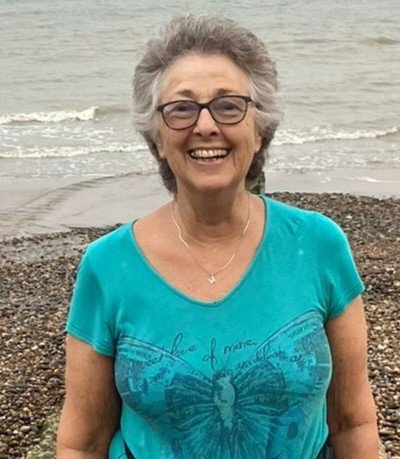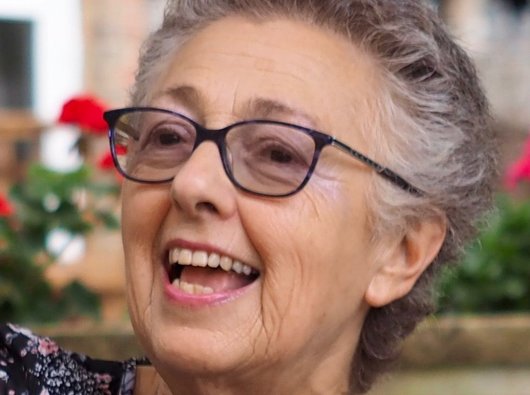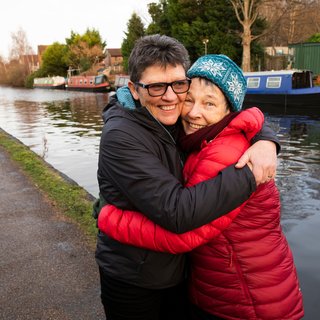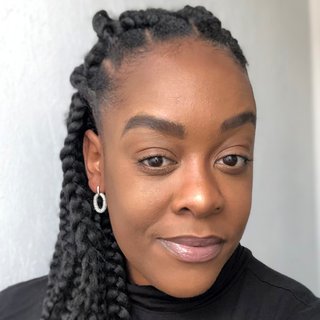It’s important to have access to an MPN specialist
Marilyn has been living with myelofibrosis (MF) since 1990. She explains the range of treatments she’s had and what she thinks people should expect from their care.

I had no symptoms when I was diagnosed with myelofibrosis. I was 38 years old, and I had two young children.
My new GP had spotted that I had an enlarged spleen and referred me to the local hospital. I thought they were just going to say I was anaemic and needed iron. But it turned into a very thorough conversation with a consultant.
They took loads of blood. They also did a bone marrow biopsy, which was a bit unpleasant, and then they left me on my own to recover.
I was starting to put two and two together. They’d been asking me about my mother, who’d had myelofibrosis.
It’s very unusual for two people in the same family to have the same blood cancer, although mine was a different form. Hers was characterised by low red blood cells which meant she had to have regular transfusions, whereas mine was characterised by high platelets.
At first, I was very upset, worried about what was going to happen to my children. But I had no choice but to get on with it. And I think largely, over the years, I’ve taken it in my stride."
The treatments I’ve had
I’ve had just about every possible treatment in the last 33 years. I started on interferon injections, and soon they added hydroxycarbamide tablets as well.
I did the injections myself at home, so I had to explain things to my daughters, but they weren’t bothered by it. In fact they were fascinated and liked to watch!
After a while on interferon and hydroxycarbamide, my doctors asked if there was anything I wanted to change. I said I didn’t like the prospect of injecting myself for the rest of my life. So they suggested dropping the interferon, just like that!
I carried on with hydroxycarbamide on its own, plus aspirin to lower my risk of blood clots.
I had two wonderful consultants in the first 20 years. We knew each other, we had a relationship. And that’s so important."
I tolerated the hydroxycarbamide really well and pretty much forgot there was anything wrong with me. I carried on living my normal life.
At one point I saw a different doctor who took me off hydroxycarbamide because I’d started to develop leg ulcers, probably caused by taking the medication over a long period.
Initially he didn’t give me anything else, and my platelets started to soar. Then I saw my regular consultant who put me on anagrelide, but that caused various side effects.
By this time, both my consultants had retired and I was eventually introduced to a lovely new doctor who wanted to put me on ruxolitinib. However, it wasn’t approved yet, so I tried a hormone-based treatment and also went back on interferon for a while.
Then the doctor managed to get me on ruxolitinib and that’s what I take today, along with aspirin and aciclovir."
Aciclovir is an anti-viral medication that prevents shingles, which can be a side effect of ruxolitinib.
If you’re on ruxolitinib, you have to be careful about your skin, and I’ve had a small patch of skin cancer removed which may be related. My consultant has referred me to a dermatology specialist for that, so I’m being checked regularly.
The future of MF treatment
“When I think back to when I was diagnosed in the early '90s, and when my mum was diagnosed in the early '80s, there have been so many strides forward. I know they are trialling new medications all the time, so the future of treatment really does excite me.”

How I feel now
At the moment, my blood counts are relatively stable. My platelets go up and down a bit and I’m always a little anaemic. That makes me very tired, but if they reduce the ruxolitinib to increase my haemoglobin, my platelets could increase too much. It’s a bit of a balancing act.
Mentally, I‘m a bit more nervous now than I used to be, especially if I get something on my skin, worrying if it’s going to be something. And feeling exhausted. I think that’s because I’m older and obviously slowing down anyway. But I still work two days a week and that helps to keep me going.
What I’ve learned over 33 years
It’s absolutely vital to have a really good specialist and to realise that the haematologist you’re referred to isn’t necessarily a specialist in MPNs.
When I came off hydroxycarbamide, I had two or three iffy years where I was seeing a different consultant each time and had no faith or confidence in my care That was the worst time.
Today I’m very lucky. I have a wonderful consultant haematologist locally, who has the support of an MPN specialist in one of the main teaching hospitals in London. If my consultant wants to check she’s making the right decision regarding my care, she drops the specialist a line and takes her advice.
So I worry about people who don’t have support from an MPN specialist and I think they should ask for one."
You should also have contact details for a specialist nurse. I didn’t even know they existed until seven or eight years ago. You may feel more comfortable talking to a nurse and you can often get quick answers to your questions.
It’s best if you can take someone with you to medical appointments. When I was diagnosed, I didn’t hear a word the doctor said. I honestly thought my hearing had been affected. It was ages before I realised it was psychological – my brain just couldn’t take it all in. Luckily, I had two people with me who could tell me what the doctor had said!
It’s also important to know you CAN overcome your fears. I was very squeamish and never thought I’d be able to inject myself, but I wanted to take control so I learned very quickly to do what I had to do in order to be as healthy as possible.
Where to get support
Our Support Service can help you to manage relationships with healthcare professionals and get the most out of your appointments. Call us free on 0808 2080 888 or email us.
Marilyn helped us create our booklet about myelofibrosis, including understanding myelofibrosis, treatments and living well. Order your free copy.



